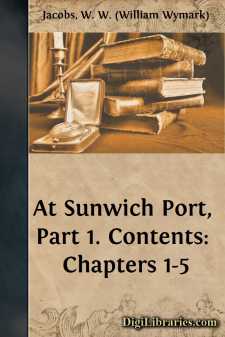Categories
- Antiques & Collectibles 13
- Architecture 36
- Art 48
- Bibles 22
- Biography & Autobiography 813
- Body, Mind & Spirit 142
- Business & Economics 28
- Children's Books 15
- Children's Fiction 12
- Computers 4
- Cooking 94
- Crafts & Hobbies 4
- Drama 346
- Education 46
- Family & Relationships 57
- Fiction 11828
- Games 19
- Gardening 17
- Health & Fitness 34
- History 1377
- House & Home 1
- Humor 147
- Juvenile Fiction 1873
- Juvenile Nonfiction 202
- Language Arts & Disciplines 88
- Law 16
- Literary Collections 686
- Literary Criticism 179
- Mathematics 13
- Medical 41
- Music 40
- Nature 179
- Non-Classifiable 1768
- Performing Arts 7
- Periodicals 1453
- Philosophy 64
- Photography 2
- Poetry 896
- Political Science 203
- Psychology 42
- Reference 154
- Religion 513
- Science 126
- Self-Help 84
- Social Science 81
- Sports & Recreation 34
- Study Aids 3
- Technology & Engineering 59
- Transportation 23
- Travel 463
- True Crime 29
W. W. (William Wymark) Jacobs
William Wymark Jacobs (1863–1943) was an English author known for his macabre short stories and humorous tales. His most famous work is "The Monkey's Paw," a chilling story about the perils of interfering with fate. Jacobs' writing often depicted life by the docks, reflecting his upbringing in the docklands of London.
Author's Books:
Sort by:
BREAKING A SPELL "Witchcraft?" said the old man, thoughtfully, as he scratched his scanty whiskers. No, I ain't heard o' none in these parts for a long time. There used to be a little of it about when I was a boy, and there was some talk of it arter I'd growed up, but Claybury folk never took much count of it. The last bit of it I remember was about forty years ago, and that...
more...
CHAPTER I The ancient port of Sunwich was basking in the sunshine of a July afternoon. A rattle of cranes and winches sounded from the shipping in the harbour, but the town itself was half asleep. Somnolent shopkeepers in dim back parlours coyly veiled their faces in red handkerchiefs from the too ardent flies, while small boys left in charge noticed listlessly the slow passing of time as recorded by...
more...
THE OLD MAN OF THE SEA "What I want you to do," said Mr. George Wright, as he leaned towards the old sailor, "is to be an uncle to me." "Aye, aye," said the mystified Mr. Kemp, pausing with a mug of beer midway to his lips. "A rich uncle," continued the young man, lowering his voice to prevent any keen ears in the next bar from acquiring useless knowledge. "An uncle...
more...
OVER THE SIDE Of all classes of men, those who follow the sea are probably the most prone to superstition. Afloat upon the black waste of waters, at the mercy of wind and sea, with vast depths and strange creatures below them, a belief in the supernatural is easier than ashore, under the cheerful gas-lamps. Strange stories of the sea are plentiful, and an incident which happened within my own...
more...
THE VIGIL "I'm the happiest man in the world," said Mr. Farrer, in accents of dreamy tenderness. Miss Ward sighed. "Wait till father comes in," she said. Mr. Farrer peered through the plants which formed a welcome screen to the window and listened with some uneasiness. He was waiting for the firm, springy step that should herald the approach of ex-Sergeant-Major Ward. A squeeze of...
more...
STEPPING BACKWARDS "Wonderful improvement," said Mr. Jack Mills. "Show 'em to me again." Mr. Simpson took his pipe from his mouth and, parting his lips, revealed his new teeth. "And you talk better," said Mr. Mills, taking his glass from the counter and emptying it; "you ain't got that silly lisp you used to have. What does your missis think of 'em?"...
more...
CHAPTER XI Jack Nugent's first idea on seeing a letter from his father asking him to meet him at Samson Wilks's was to send as impolite a refusal as a strong sense of undutifulness and a not inapt pen could arrange, but the united remonstrances of the Kybird family made him waver. "You go," said Mr. Kybird, solemnly; "take the advice of a man wot's seen life, and go. Who...
more...
THE UNDERSTUDY "Dogs on board ship is a nuisance," said the night-watchman, gazing fiercely at the vociferous mongrel that had chased him from the deck of the Henry William; "the skipper asks me to keep an eye on the ship, and then leaves a thing like that down in the cabin." He leaned against a pile of empty casks to recover his breath, shook his fist at the dog, and said, slowly—...
more...
A MIXED PROPOSAL Major Brill, late of the Fenshire Volununteers, stood in front of the small piece of glass in the hatstand, and with a firm and experienced hand gave his new silk hat a slight tilt over the right eye. Then he took his cane and a new pair of gloves, and with a military but squeaky tread, passed out into the road. It was a glorious day in early autumn, and the soft English landscape was...
more...
CHAPTER I MR. JOHN VYNER, ship-owner, pushed his chair back from his writing-table and gazed with kindly condescension at the chief clerk as he stood before it with a handful of papers. "We shall be able to relieve you of some of your work soon, Hartley," he said, slowly. "Mr. Robert will come into the firm next week." The chief clerk bowed. "Three years at Cambridge," resumed...
more...











